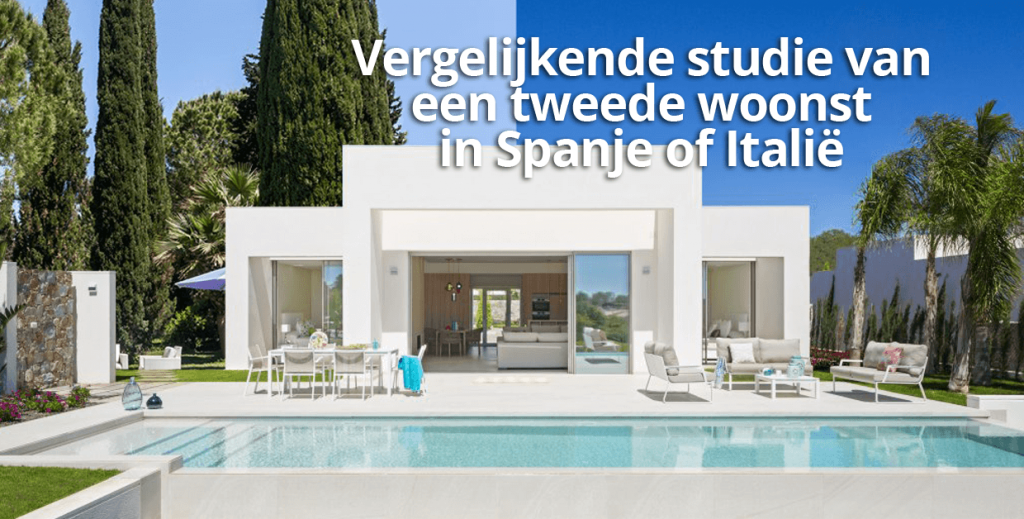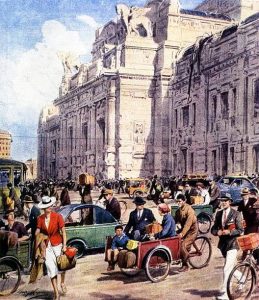At first glance, Spain and Italy have quite a bit in common. Both are countries rich in history, countries where romance, culture and culinary delights reign supreme. But remove the superficial scratch layer and the differences are exposed. This is all the more true once you want to buy a second home in Spain or Italy.

We do not want to start a war here between Italophiles and fans of España. Some swear by espresso from a mug shot, others can't go a day without tapas. One likes to communicate with his hands, while the other starts daydreaming of his siesta around noon. That's okay. To each his own, we reason.
And yet. There are also Belgians who can stomach both countries - and who cannot, with the best will in the world, choose exactly where to set up their second camp. Especially for those eternal doubters, we juxtapose Spain and Italy in this blog article.

Culture
Even those who are wild about Gaudi and Picasso will have to reluctantly admit it: in terms of culture, Italy has no equal. Florence, Venice, Rome and a host of other historical gems: history is there to be picked up on every street cobblestone and lurks beyond every vaulted arch.
[caption id="attachment_1775" align="aligncenter" width="300"]

Florence: dream for culture lovers.[/caption]
And okay, Spanish cities usually have style, are warm and beautiful and leave plenty of room for pedestrians. Barcelona and Sevilla are far from hurting the eyes. But rivaling the Italian magical dream worlds - with its piazzas, fountains and art - no, they cannot.
Intermediate score: Spain-Italy 0-1
Climate
The south of Italy is nice and warm, but in the north the winters are cold. Not that it is never cold in Spain. But even the inhabitants of Galicia, Asturias, Cantabria and the Basque Country do not have to pull out their winter coats as often as those of Piedmont and Lombardy.
And they certainly don't see as much fog as the Italians. It hangs during autumn everywhere in the Boot, around the lakes in the north, above the canals of Venice, among the Tuscan hills and near the coasts.
[caption id="attachment_1779" align="aligncenter" width="300"]

Fog over Venice's canals: a common sight during Italian autumn.[/caption]
Southern Spain is swelter in summer and milder in winter. On the Costa Blanca and Costa del Sol, even during the coldest months, you regularly have breakfast outside. No wonder people in the know call this the best climate in Europe. According to the World Health Organization (WHO), it is also the healthiest.
Standings: Spain-Italy 1-1
Culinary
Spanish wine should not be inferior to Italian. Belgians will also rejoice there because of the beer culture: Spaniards drink beer as if it were water. The bars there tend to be cozier than in Italy. It may be personal taste, but we would rather sit in a cozy bodega than slurp up our espresso at the counter in an Italian coffee house.
[caption id="attachment_1777" align="aligncenter" width="300"]

The best of Italy on a plate.[/caption]
Not to mention the Spanish delicacies. Serrano ham, sangria, paella, tapas and tortilla: who ever gets enough of them? And yet, despite if those assets, Spain must lose out here. Because admit it, Italian cuisine doesn't even need an introduction. Italy wins, but only in injury time.
Standings: Spain-Italy 1-2
Beaches
Spain possesses more blue flags than any country in Europe. A blue flag is a seal of approval for clean and safe beaches. Nearly 600 has Spain. Not difficult with 8,000 kilometers of coast to choose from. Mediterranean Costas in the south, pearly islands and dramatic cliffs in the north - there is something for everyone.
[caption id="attachment_1782" align="aligncenter" width="300"]

Spain has more blue flags than any other country.[/caption]
Italy also has beautiful beaches, not to mention. Some 342 of them have been awarded blue flags. Unfortunately for beachcombers: a lot of those beaches are paid. You read it correctly: you have to pay not only for a chair or a beach umbrella, but even just to be allowed on the beach. In fact, many of the most beautiful beaches are private land. Sin!
Intermediate score: Spain-Italy 2-2
Life cost
Both Spain and Italy are cheaper on average than Belgium. Of course, this depends somewhat on the region and the way you live: those who eat only in tourist restaurants will be more expensive in both countries than the adventurer who also frequents local eateries and canteens. Soon you will also discover that the quality of food in the latter is often higher.
The southern Costa's and Italy's coastal areas are generally more expensive than the inland areas of both countries. Logical, because of the higher demand there. However, this also has advantages. In particular, you can rent out your residence more easily and thus capture more revenue.
Comparing Spain and Italy among themselves, Spain easily emerges victorious. Especially restaurant visits and groceries are a lot cheaper there. Electricity and gas are also more expensive in Italy. Again, some of this does depend on your region of preference.

Intermediate score: Spain-Italy 3-2
Transport
Italy's train network is magnificent, but it ends there. The rest of transportation is, as the cliché would have it, often unreliable. Especially on buses and subways, you'd better not set your clock right. In Spain, public transportation is excellent and inexpensive. Consider the coastal streetcar on the Costa Blanca. For little money, you can also buy bus tickets for connections between major cities.
Traffic is a lot less hectic in Spain than in Italy. Italians are nervous, choleric, sometimes even downright adrift people, making it sometimes a true suicide mission to venture into traffic on your own. Spaniards are much more relaxed and less fired up. You will notice this when you have to take the car on the road yourself.
[caption id="attachment_1783" align="aligncenter" width="259"]

The hectic traffic in Milan in 1943. These days, there are more Vespas.[/caption]
Both countries have regular, low-cost flights to and from Belgium.
Intermediate score: Spain-Italy 4-2
A second residence in Spain or Italy
Purchase Process
In Italy, a real estate agent represents the interests of both parties, buyer and seller. This is why it is useful to have a lawyer in addition to keeping an eye on things for you. The broker charges 3 to 8 percent, to be split between buyer and seller.
Then a notary will record the agreements. The buyer pays the notary, usually 2 to 3 percent of the price in the deed. The buyer also deposits a down payment, often 10 to 20 percent of the purchase price. You will lose that amount if you still withdraw. If the buyer withdraws, then he must double refund the deposit.
In Spain, an estate agent is not mandatory, but it is damn handy. After all, a little real estate agent can make a good assessment of the local market. Typically, the broker charges 3 percent, although it can also be 5 or 10. In any case, as a buyer, you should care little about this: unlike in Italy, the seller must pay the broker's fee. So here you will not encounter unpleasant surprises. As in Italy, the notary will draw up a deed of sale.
Even in Spain, it is a good idea to hire a lawyer who knows a little about the local real estate environment. He can also review the contract. There is often an upfront payment of 10 percent.
Additional Costs
In both Italy and Spain, you better have a lawyer find out if there are debts hanging on the property. In fact, these are transferred to the buyer in both countries.
If you are buying real estate in Italy, it's best to count on an extra 15 percent - for notary, taxes, broker, appraiser and possibly a translator. The country has a 10 percent transfer tax on purchase and a 20 percent profit tax on sale. You may also pay a property tax, a percentage on the cadastral value. In practice, however, the legal exemption is large enough: most homeowners do not have to contribute. However, they do pay an income tax calculated on the cadastral value and rental income.
Even in Spain, it is best to count 10 to 15 percent for all kinds of extra costs. A transfer tax of 7 percent will be paid there only if you buy directly from a private individual. If you do business with a real estate agent or developer, you will pay 7 to 16 percent VAT. Property taxes depend on the municipality and cadastral value. Other taxes - such as plusvalia - are usually not borne by the buyer unless so agreed. Capital gains tax depends on the value of your property - and whether or not you reside there. Do count on at least 21 percent.
Municipal taxes depend on the region in both countries. You often pay separately for additional services, such as garbage collection. In Spanish housing complexes, there is usually a surcharge for common expenses - the amount depends somewhat on the facilities available.
Bureaucracy
[caption id="attachment_1776" align="aligncenter" width="300"]

Buying in Italy: infinite head breakers.[/caption]
Unfortunately, the cliché is true: Italy is a bureaucratic underworld. Drafting contracts, finalizing purchases - it's often a hellscape without end. It takes a long time to get things arranged and takes a lot of energy.
Patience is a basic requirement, otherwise you will go crazy. And that is best avoided: once on their horses, Italians are even more troublesome customers. Another typical Italian scenario that can give you a stinging migraine as a buyer: 10 siblings inherit a property; 9 of them want to sell, the tenth does not.
Mamma mia!
In Spain, things run a little more efficiently and it is easier to do business. Not that
buying a residence in Spain is child's play, it's not that simple either. But it's not the Mount Everest it sometimes is in Italy.
There was a time when some developers were not completely clean on the ground, causing projects to fail or innocent people to be evicted from their homes. Although you still have to be careful who you get involved with, the Spanish situation has improved dramatically in that regard. The government has learned much from the real estate bubble and accompanying crisis: the real estate world is much more professional today.
As a foreign property owner, you must apply for an NIE number, a Numéro Identificacion de Extranjeros, in Spain. You need it to pay your taxes and take care of all kinds of other practical matters.
FINAL SCORE: SPAIN - ITALY 5-2
Conclusion: E Viva España

Let's face it, both are gems of countries. The culture and lifestyle of the two Mediterranean peninsulas are not that crazy different. Italy and Spain more or less keep each other in balance when it comes to the beauty of the country, the friendliness of the people and the pleasure of living there.
But: it is a significantly more sound idea to buy real estate in Spain. The same company is guaranteed to give you a much bigger headache in Italy. A second home in Spain or Italy, it's a world of difference.
No wonder Spain has so many expats, especially the southern coasts. Because of its wonderful climate, relatively low property prices and high standard of living, many foreigners see Spain as the ideal place for a second home. Or to retire.
Is Spain a paradise on earth for you, too? Contact Gold Estates without obligation and we will make the dream a miraculous reality.
 We do not want to start a war here between Italophiles and fans of España. Some swear by espresso from a mug shot, others can't go a day without tapas. One likes to communicate with his hands, while the other starts daydreaming of his siesta around noon. That's okay. To each his own, we reason.
And yet. There are also Belgians who can stomach both countries - and who cannot, with the best will in the world, choose exactly where to set up their second camp. Especially for those eternal doubters, we juxtapose Spain and Italy in this blog article.
We do not want to start a war here between Italophiles and fans of España. Some swear by espresso from a mug shot, others can't go a day without tapas. One likes to communicate with his hands, while the other starts daydreaming of his siesta around noon. That's okay. To each his own, we reason.
And yet. There are also Belgians who can stomach both countries - and who cannot, with the best will in the world, choose exactly where to set up their second camp. Especially for those eternal doubters, we juxtapose Spain and Italy in this blog article.

 Florence: dream for culture lovers.[/caption]
And okay, Spanish cities usually have style, are warm and beautiful and leave plenty of room for pedestrians. Barcelona and Sevilla are far from hurting the eyes. But rivaling the Italian magical dream worlds - with its piazzas, fountains and art - no, they cannot.
Florence: dream for culture lovers.[/caption]
And okay, Spanish cities usually have style, are warm and beautiful and leave plenty of room for pedestrians. Barcelona and Sevilla are far from hurting the eyes. But rivaling the Italian magical dream worlds - with its piazzas, fountains and art - no, they cannot.
 Fog over Venice's canals: a common sight during Italian autumn.[/caption]
Southern Spain is swelter in summer and milder in winter. On the Costa Blanca and Costa del Sol, even during the coldest months, you regularly have breakfast outside. No wonder people in the know call this the best climate in Europe. According to the World Health Organization (WHO), it is also the healthiest.
Fog over Venice's canals: a common sight during Italian autumn.[/caption]
Southern Spain is swelter in summer and milder in winter. On the Costa Blanca and Costa del Sol, even during the coldest months, you regularly have breakfast outside. No wonder people in the know call this the best climate in Europe. According to the World Health Organization (WHO), it is also the healthiest.
 The best of Italy on a plate.[/caption]
Not to mention the Spanish delicacies. Serrano ham, sangria, paella, tapas and tortilla: who ever gets enough of them? And yet, despite if those assets, Spain must lose out here. Because admit it, Italian cuisine doesn't even need an introduction. Italy wins, but only in injury time.
The best of Italy on a plate.[/caption]
Not to mention the Spanish delicacies. Serrano ham, sangria, paella, tapas and tortilla: who ever gets enough of them? And yet, despite if those assets, Spain must lose out here. Because admit it, Italian cuisine doesn't even need an introduction. Italy wins, but only in injury time.
 Spain has more blue flags than any other country.[/caption]
Italy also has beautiful beaches, not to mention. Some 342 of them have been awarded blue flags. Unfortunately for beachcombers: a lot of those beaches are paid. You read it correctly: you have to pay not only for a chair or a beach umbrella, but even just to be allowed on the beach. In fact, many of the most beautiful beaches are private land. Sin!
Spain has more blue flags than any other country.[/caption]
Italy also has beautiful beaches, not to mention. Some 342 of them have been awarded blue flags. Unfortunately for beachcombers: a lot of those beaches are paid. You read it correctly: you have to pay not only for a chair or a beach umbrella, but even just to be allowed on the beach. In fact, many of the most beautiful beaches are private land. Sin!

 The hectic traffic in Milan in 1943. These days, there are more Vespas.[/caption]
Both countries have regular, low-cost flights to and from Belgium.
The hectic traffic in Milan in 1943. These days, there are more Vespas.[/caption]
Both countries have regular, low-cost flights to and from Belgium.
 Buying in Italy: infinite head breakers.[/caption]
Unfortunately, the cliché is true: Italy is a bureaucratic underworld. Drafting contracts, finalizing purchases - it's often a hellscape without end. It takes a long time to get things arranged and takes a lot of energy.
Patience is a basic requirement, otherwise you will go crazy. And that is best avoided: once on their horses, Italians are even more troublesome customers. Another typical Italian scenario that can give you a stinging migraine as a buyer: 10 siblings inherit a property; 9 of them want to sell, the tenth does not. Mamma mia!
In Spain, things run a little more efficiently and it is easier to do business. Not that buying a residence in Spain is child's play, it's not that simple either. But it's not the Mount Everest it sometimes is in Italy.
There was a time when some developers were not completely clean on the ground, causing projects to fail or innocent people to be evicted from their homes. Although you still have to be careful who you get involved with, the Spanish situation has improved dramatically in that regard. The government has learned much from the real estate bubble and accompanying crisis: the real estate world is much more professional today.
As a foreign property owner, you must apply for an NIE number, a Numéro Identificacion de Extranjeros, in Spain. You need it to pay your taxes and take care of all kinds of other practical matters.
Buying in Italy: infinite head breakers.[/caption]
Unfortunately, the cliché is true: Italy is a bureaucratic underworld. Drafting contracts, finalizing purchases - it's often a hellscape without end. It takes a long time to get things arranged and takes a lot of energy.
Patience is a basic requirement, otherwise you will go crazy. And that is best avoided: once on their horses, Italians are even more troublesome customers. Another typical Italian scenario that can give you a stinging migraine as a buyer: 10 siblings inherit a property; 9 of them want to sell, the tenth does not. Mamma mia!
In Spain, things run a little more efficiently and it is easier to do business. Not that buying a residence in Spain is child's play, it's not that simple either. But it's not the Mount Everest it sometimes is in Italy.
There was a time when some developers were not completely clean on the ground, causing projects to fail or innocent people to be evicted from their homes. Although you still have to be careful who you get involved with, the Spanish situation has improved dramatically in that regard. The government has learned much from the real estate bubble and accompanying crisis: the real estate world is much more professional today.
As a foreign property owner, you must apply for an NIE number, a Numéro Identificacion de Extranjeros, in Spain. You need it to pay your taxes and take care of all kinds of other practical matters.
 Let's face it, both are gems of countries. The culture and lifestyle of the two Mediterranean peninsulas are not that crazy different. Italy and Spain more or less keep each other in balance when it comes to the beauty of the country, the friendliness of the people and the pleasure of living there.
But: it is a significantly more sound idea to buy real estate in Spain. The same company is guaranteed to give you a much bigger headache in Italy. A second home in Spain or Italy, it's a world of difference.
No wonder Spain has so many expats, especially the southern coasts. Because of its wonderful climate, relatively low property prices and high standard of living, many foreigners see Spain as the ideal place for a second home. Or to retire.
Is Spain a paradise on earth for you, too? Contact Gold Estates without obligation and we will make the dream a miraculous reality.
Let's face it, both are gems of countries. The culture and lifestyle of the two Mediterranean peninsulas are not that crazy different. Italy and Spain more or less keep each other in balance when it comes to the beauty of the country, the friendliness of the people and the pleasure of living there.
But: it is a significantly more sound idea to buy real estate in Spain. The same company is guaranteed to give you a much bigger headache in Italy. A second home in Spain or Italy, it's a world of difference.
No wonder Spain has so many expats, especially the southern coasts. Because of its wonderful climate, relatively low property prices and high standard of living, many foreigners see Spain as the ideal place for a second home. Or to retire.
Is Spain a paradise on earth for you, too? Contact Gold Estates without obligation and we will make the dream a miraculous reality.










